As part of the V&A’s ongoing collaboration with China Merchants Group, Luisa E. Mengoni, currently stationed in Shenzhen as Head of the V&A Gallery, reports from the frontlines of Chinese design and manufacturing. Here we present a series of reports on current events and dialogues with some of the region’s most influential and insightful figures. The aim is to get a finger on the pulse concerning the monumental shifts taking place in the way things are designed and made, from one of the most important manufacturing centres in the world.
Maker spaces and maker events are multiplying quickly around China. Increasingly ambitious, these spaces and events have grown beyond just groups of DIY enthusiasts and inventors gathering to make things. Instead, different and innovative propositions are being developed to rethink modalities of creating, sharing, and manufacturing. They are attempts at shaping a wider and diversified ‘making culture’ that is bringing new ideas and specific developments across a range of sectors, from science to design, from engineering to environmental applications, even new retail models. These initiatives vary given the specific geographical opportunities and cultures found in mainland China, Hong Kong and Taiwan. Below is a sampling of projects from each of these regions.
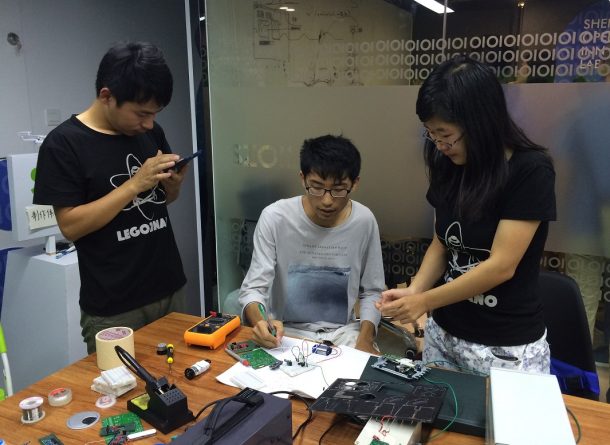
Shenzhen – Empowering Scientists to Make
A fascinating expression of how maker culture informs other sectors is in the world of science. A few days ago the Shenzhen Open Innovation Lab (SZOIL) hosted the Lego2Nano Open Day thanks to the enthusiastic involvement of its director David Li (see blog here). This was the concluding event of a two week summer school for Chinese and British undergraduate and PhD students aimed at developing an open source, low-cost, and user friendly Atomic Force Microscope (AFM) prototype combining LEGO, Arduino, 3D printed and laser-cut parts, and low cost electronic components. The first edition of the summer school was initiated in 2013 by Professor Francois Grey from the University of Geneva and co-organised by the London Centre for Nanotechnology and Institute of Making at UCL, the Institute of Micro/Nanoelectronics at Peking University, the Centre of Nano and Micro Mechanics and the Academy of Art and Design at Tsinghua University, and the Citizen Cyberscience Centre at the University of Geneva in collaboration with the LEGO Learning Institute. This year the summer school included a first week at Tsinghua University in Beijing, and a second week at the SZOIL in Shenzhen. Underlying the approach of the summer school is an open source model, where knowledge of programming, engineering and design is shared by students and made available on-line for further discussion and integrations. Involvement into the analysis of data is also possible through a crowdsourcing area set up on-line. The school’s participants organise as part of the programme focussed workshops for Chinese primary and high school students and open days for the wider public to introduce nanotechnology to diverse audiences.
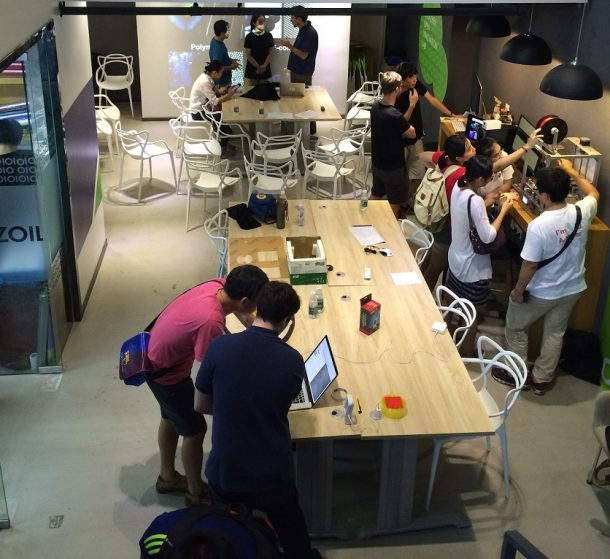
It is an effort to make science easier to understand, more accessible and also fun. As Professor Grey notes, this is a way of ‘applying the maker philosophy to science’ and allowing science students to re-discover how to ‘make’ scientific instruments instead of solely relying on ready-made equipment. It is not surprising that this year the school has added Shenzhen as a destination: the availability of electronic and mechanical components in the city is staggering and several technology companies and start-ups are investing in research and exploring the potential of open system models. Seeed (see blog here) is one of the supporters, as well as Makeblock, a company specialised in making robots, one of the most successful start-up enterprises in the area.
About
Hong Kong – A Maker Space with a Social Innovation Mission
Another expression of maker culture with a specific application is MakerBay, the ‘Hong Kong makerspace for social and environmental impact’ established in July 2015 by Cesar Harada and managed by Fiona Ching. Cesar is a phenomenally dynamic inventor/entrepreneur plus environmentalist who has travelled all over the world analysing pollution in waters and is currently developing ‘Protei’, an open source sailing robot to investigate the ocean. He decided to relocate to Hong Kong due to its international dimension and proximity to Shenzhen, and set up a co-working space for hard-ware start-ups, engineers, students and DIY enthusiasts interested in exploring ideas and developing creative projects involving biology, robotics, engineering, optics and chemistry, and preferably with a social and environmental impact. High tech equipment (3D printers, laser cutters) are available in the space, as well as tools to work with wood, metal, textiles, and composite materials. Ideas can be turned into prototypes and small-scale production. Crucial is the vicinity to Shenzhen where the ready availability of components, the existing network of suppliers and – last but not least – the partnership with companies like Seeed make production much cheaper and faster than anywhere else in the world.
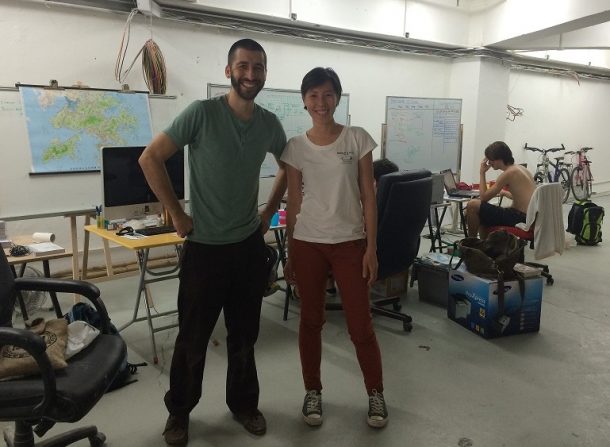
Another important component of MakerBay’s ambition is to create environmental awareness and social cohesiveness through the organisation of workshops or project-based classes for kids (5 to 14 years old) and teachers, as well as events building up a more inclusive and diverse community. The workshop on making a ‘windtrain’ in August was offered for free to children between 8 to 14 as part of the Maker Camp in Hong Kong, and a small mini-maker space has been set up in Harbour School in Hong Kong. Cesar hopes that environmental awareness will also be infused by a more harmonic and holistic view of our relationship with nature as conceived in Asian philosophy. http://www.makerbay.org/whatson/
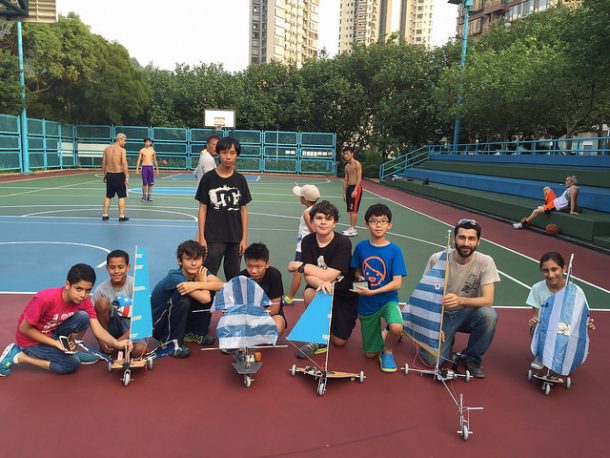
Other interesting manifestations of maker culture can be found in Taiwan, where a clear trend toward the promotion of innovation and creative industries is seen in a number of grassroots activities, government-led initiatives, new creative parks and emerging business models. My recent visit to maker spaces was facilitated by Wayne Lin, business development manager of the new Seeed branch established in Taipei six months ago. Wayne used to work at Foxconn for the development of a commercial/incubator plaza, which aims to combine retail with technology start-ups.
Taipei – New Models for Connecting People with Making
The largest maker space in Taipei is Futureward, a non-profit organisation established in 2014 by Daniel Lin and Yang Yu-hsiu. It is located in a former industrial building at Tatung University, a private institution funded in 1956 by the Tatung Company and offering courses in industrial design. Tatung is a major corporation dating back to 1918 and specialised in digital consumer products (PCs, tablets, screens) and home appliances. They also produce PC hardware on an OEM basis to companies like Hewlett-Packard, Compaq, Dell and Acer. FutureWard develops on the strength of Tatung University’s experience in the field of industrial design, but is also crafting new programmes that have a wider resonance and deeper social and economic impact.
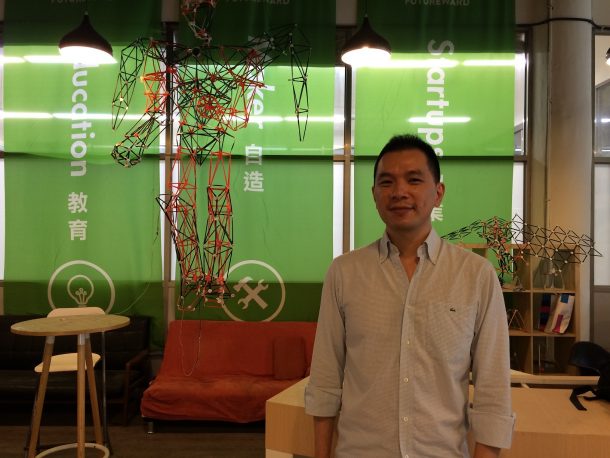
Like other co-working maker spaces, FutureWard offers manufacturing, co-working, and social areas with a range of different machines and tools that have been partly given by the University and partly purchased. Marketing, PR, on-line sales, and crowdfunding services are also offered through a membership scheme.
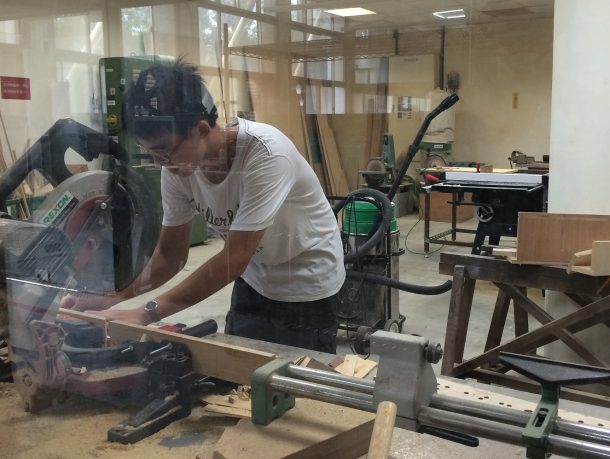
The main ambition of Futureward is twofold: on the one hand working in education with kids and teachers and on the other developing a sustainable ecosystem that makes full use of a network of small and medium factories of hardware and electronics still existing in Taiwan as well as their supply chains, equipment and tools. They aim to find ways of innovating traditional manufacturing practices and capabilities through a clever use of the Internet and technology, as well as creating a community of manufacturers making objects in metal, plastic and other materials in low volumes but of higher quality. Such an ambitious vision may also lead to very practical revitalisation projects for industrial areas with the involvement of other partners.
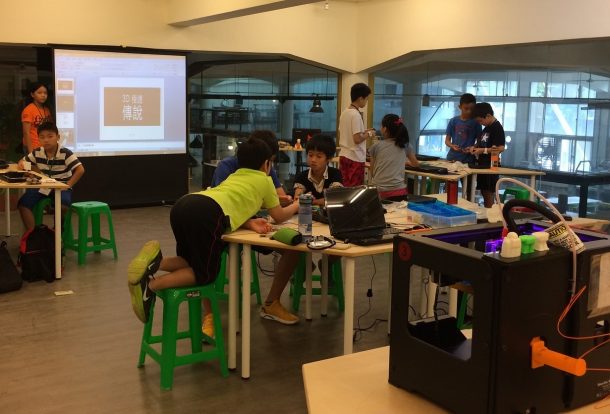
A different emphasis is given by the MakerBar, established in 2013 by Monica Shen and Kay Yu Kamm. It now runs its activities in a building that will be demolished at the end of the year and another space will soon be needed. The main objective of this maker space, in addition to promoting maker culture and developing a maker community, is to create very close and sustainable links between makers and designers. The founders are designers themselves and are keen to bridge the existing gap between hardware orientated engineers, hobbyists and inventors, who are unfamiliar with design as a discipline and practice, and the community of designers who are not versed in coding or programming. Their source of inspiration was Dimension + (Hong Kong – Taiwan) (see blog here). They organise specialist workshops with makers and designers, inviting them to submit ideas to make open source design products, although it is still difficult to encourage designers to participate in open-source processes and make them distance themselves from the very ingrained concept of ownership of their own products. Their final goal is to develop designed products that can be sold.
www.makerbartaipei.com
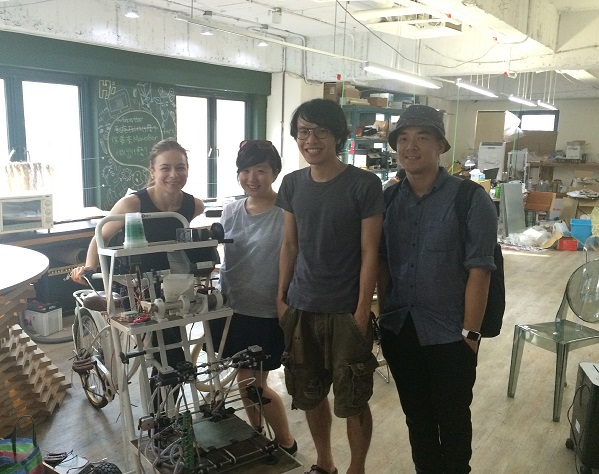
New retail models that aim to introduce art and creativity in their premises seem to be experimenting with different approaches to making. The new retail development in Songshan Creative and Culture Park in Taipei, includes ‘curated’ retail areas (design and fashion shops, tea houses, bookshop, etc) that reflect the new model developed by Eslite, a company that regularly works with developers and investors to provide interior design and management services. Incidentally, Eslite seems to be becoming extremely popular in mainland China with examples such as the Fangsuo bookshop in Guangzhou. The second floor of the Eslite building in Songshan is devoted to design and crafts with areas that have been turned into workshops for leather, ceramics, glass, plywood, jewellery and paper. Customers can apply for a course and make their own items instead of simply buying them. From a very superficial look at the shops these initiatives seem to be very successful, even if they are set up in rather ‘manicured’ environments.
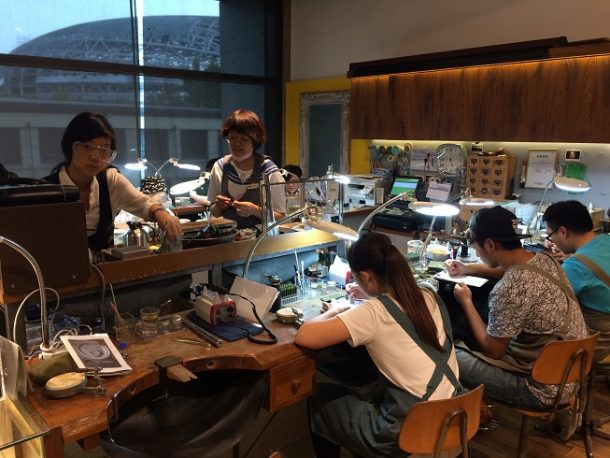
A further reflection on new forms of craftsmanship and materiality will be the focus of the panel ‘Technology as Craft’ organised by the V&A as part of a Beijing Design Week forum scheduled for September 27th this year. Through the specific experiences of speakers operating in the Pearl River Delta, this panel will explore how Shenzhen – once regarded as ‘factory of the world’ – is now providing a fertile ground for technological innovation and experimentation, attracting Chinese and international hacker groups, tech start-ups and accelerator programmes. We will discuss whether technology can indeed be regarded as a new form of craftsmanship and how the open source approach adopted by makers, designers, tech start-ups and developers is shaping new models of thinking, designing and manufacturing, as well as offering potential solutions for the revitalisation of urban areas and their communities.